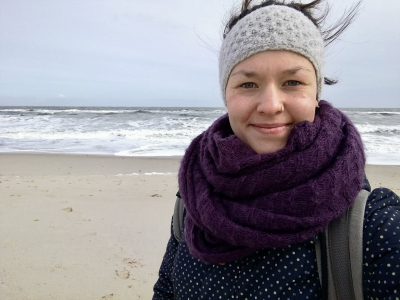- Graduate School GLOMAR
- PhD student members
- Johanna Berlinghof
Johanna Berlinghof
| Institution: | University of Bremen |
| Office: | UFT, room 2170 |
| Phone: | +49 421 218 63358 |
| E-mail: | [Bitte aktivieren Sie Javascript] |
| Other webpage(s): | Johanna's working group web page |

PhD Project
The role of the seagrass-holobiont in biogeochemical cycling under climate change
Seagrasses are among the most important marine ecosystem engineers, providing a variety of ecosystem services, such as primary production, coastal protection, habitat formation, and serving as a food source for many organisms. Seagrasses also modulate fluxes of energy and nutrients in coastal habitats, releasing considerable amounts of oxygen while intensively sequestering CO2.
Seagrasses are inhabited by a community of symbiotic microbes that, together with their host, form the so-called ‘holobiont’. The different compartments of the holobiont are strongly interacting with each other and therefore affecting several fundamental processes, such as carbon (C) or nitrogen (N) cycling. Our understanding of the role of microbe-host associations in driving C or N cycling in coastal benthic ecosystems is limited, and so is our ability to predict the consequences of human impacts on the functioning of these ecosystems. One of the most severe impacts of anthropogenic emissions is ocean acidification (OA). However, very little is known about the effects of OA on biogeochemical cycling driven by benthic microbe-host associations. Therefore, in this project, I aim to answer the overarching question of whether microbe-host associations act as drivers of biogeochemical cycling in benthic coastal ecosystems and whether and how OA will affect fluxes of C and N at the organism and the ecosystem scale.
To answer these questions, I will investigate seagrass meadows that are subject to a local and long-term reduction of seawater pH at CO2 vents located at the Gulf of Naples. In-situ incubations combined with experiments under controlled lab conditions will be used to understand metabolic fluxes and deliver knowledge about the microbial community involved. Additionally, mesocosm experiments with different levels of local and global stressors will be carried out to test the role of the microbe-host association in conferring stress resistance and resilience to the organisms involved. This project will broaden our knowledge about symbiotic relationships between seagrasses and microorganisms under Climate Change, providing knowledge for protection and restoration measures.
Thesis Committee
| Prof. Dr. Christian Wild | University of Bremen |
| Prof. Dr. Harald Gruber‐Vodicka | Max Planck Institute for Marine Microbiology (MPI-MM), Bremen and University of Kiel |
| Dr. Ulisse Cardini | Stazione Zoologica Anton Dohrn Napoli, Italy |
| Dr. Katharina Kitzinger | Max Planck Institute for Marine Microbiology |


